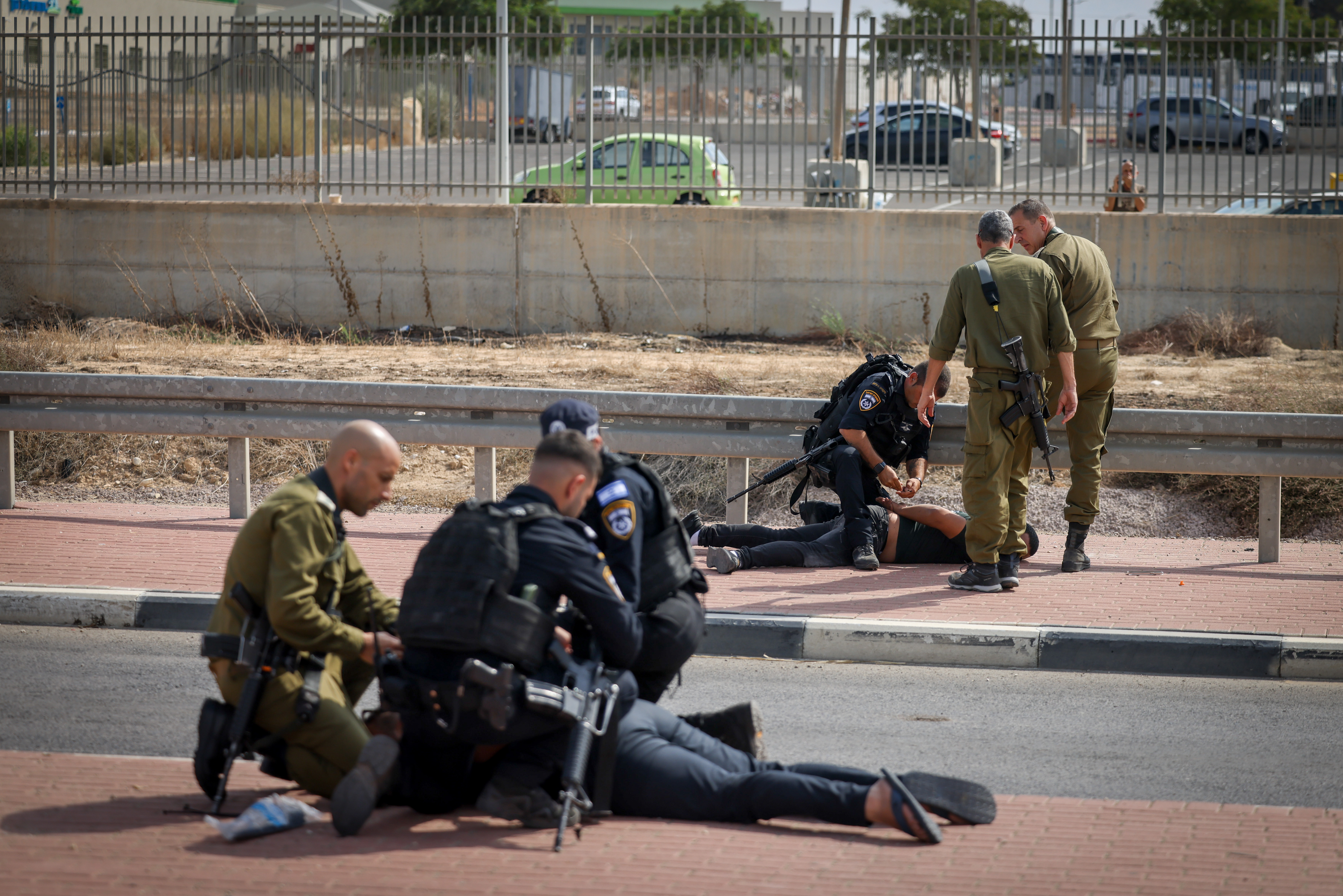The Police at War, As I Explained to My Son
Policing does not usually involve battles with terrorists. But the unique situation in Israel has shaped the role of our police officers to include internal security missions. What are the skills and capabilities required of police officers in Israel? Do they have sufficient funding? Those are some of the questions Israeli society must attend to once the current crisis is over.

Photo by Chaim Goldberg/Flash90
On Saturday October 7, the commander of Rahat police station Chief Superintendent JR Davidov was killed in a gunfight with terrorists, after engaging in combat in several different locations. On the same day, four other officers from the same station were also killed. In total, the first five days of the war claimed the lives of 51 Israeli police officers, most of them from the Southern District. “I thought that soldiers die in wars, not police officers,” said my six-year-old son.
It's no wonder he’s confused. Policing does not usually involve battles with terrorists. But the unique situation in Israel has shaped the role of our police officers to include internal security missions. Following various attacks resulting in civilian casualties (the 1974 Ma’alot terrorist attack is particularly seared in the memory of Israelis), Israeli police were required to take on tasks that their counterparts in other Western countries adopted only decades later, particularly following the 9/11 attacks.
These tasks add a layer of complexity to a profession that is already one of the most complicated in the public sector. Police officers have to carry out numerous responsibilities, including caring for children who are lost, helping confused elderly people with dementia on the street, dealing with vicious arguments between neighbors, tending to women who have suffered domestic violence, and fighting criminal gangs and gun violence.
Our conception of the role of the police, as citizens in Israel and in Western society in general, is that they should be called when "something-is-happening-which-ought-not-to-be-happening-and-somebody-better-do-something-about-it-now." This is an impossibly broad expectation, and it demands that police officers assume a variety of identities—from kindly nurses to hardened thief catchers. The knowledge that such people exist is part of what gives us the confidence to go about our lives, knowing that someone is there who will come to our defense if necessary. Police officers are the arms of the state, there to protect us.
On October 7, “something happened which ought not to have happened.” For many citizens in the Gaza border region, the state simply did not arrive, and they were left to face the horror alone. In some places it was police officers who were the first to respond, to stand in the line of fire, to defend, and to be killed, before the military arrived. JR was one of them. He was an intelligent, professional, and above all, dedicated commander. Over the last decade, I have met many police commanders with these qualities, all with an unbelievable dedication to duty.
But the dedication of our police is not always seen by the public. Public trust is an elusive quantity, and public trust in the police in Israel has been low for some time, for various reasons. It dropped even further during the COVID pandemic. In a divided society such as ours in Israel, with a police force that has been starved of funding for years, the police’s performance is not able to reflect the dedication of our police officers. During this year’s protests against the government’s reforms, the police force has been split between the opposing sides, with each feeling that the police is “against us.” With the flames being fanned by politicians, the police’s critical neutrality has been harmed, and the police itself has been portrayed as politically motivated and weak.
“Mom, was it also your policemen who died?” my son asked. “Yes,” I told him. “You must be very sad.” “Yes,” I said, “these are our police officers.” Their sacrifice, and that of their families, is terrible. I only hope that it leads Israeli society to truly see our police service—its challenges and needs, failures and successes. As we saw during COVID and during the protests, the character and nature of the police has a significant influence on the character of society and on the quality of democratic life of its members. What are the skills and capabilities required of police officers in Israel? Do they have sufficient funding? Personnel? Training, as recruits and on-the-job? Organizational and emotional support? A dignified working environment? On the day after the war, Israeli society will have to answer these questions—among other reasons, because police officers in Israel do not have the right to unionize and are not protected by the labor laws that apply to the rest of us.
The current period of chaos will end, and on the day after the war the problems faced by the officers at the Rahat police station will still remain. JR will not be there to address them, but it is to be hoped that as a society, we will recognize the importance of the police’s work, and will make the necessary changes to enable our police officers to do their jobs in a way that affords dignity both to us and to them.
